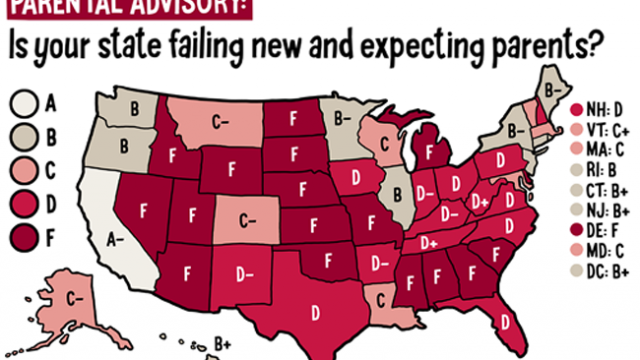Last week, National Partnership released their third edition of their one-of-its-kind report, Expecting Better. Their analysis of state laws includes a state-by-state report card and shows how each state stacks up when it comes to supporting new and expecting parents. The sad truth is that the majority of states earned a “D” or worse.
From the Foreward:
Nine years ago, in 2005, the National Partnership for Women & Families published the first edition of Expecting Better, a comprehensive review of federal and state laws that help expecting and new parents take leave during pregnancy and when a child arrives. Two years ago, in 2012, that report was updated to recognize and evaluate policy developments and progress for new and expecting parents and a wider set of employed family caregivers.
In this third edition of Expecting Better, there are further signs of progress. Across the United States, 24 million workers now have statutory protections guaranteeing access to paid sick days, paid family leave and paid medical leave through temporary disability insurance programs.
The momentum is encouraging. In just the two years since the second edition of Expecting Better :
- Rhode Island adopted the nation’s third paid family leave insurance program and several states, including Connecticut, Vermont and New Hampshire, have convened formal task forces to study options for paid family leave at the state level.
- California expanded its paid family leave law to give workers the right to care for a wider range of family members, including siblings, parents-in-law, grandparents and grandchildren. The expansion goes into effect on July 1, 2014.
- Four cities adopted new paid sick days laws, and the District of Columbia expanded its paid sick days law, guaranteeing more workers the right to earn paid sick time. Seven cities and one state now guarantee workers the right to earn paid sick time, with more progress likely in the near future.
- Colorado expanded workers’ ability to take unpaid, job-protected family leave to care for domestic partners.
- Maryland expanded workers’ ability to take unpaid, job-protected family leave upon the birth or adoption of a child, beginning in October 2014.
- Minnesota expanded the length and purposes of unpaid, job-protected family leave available to workers upon the birth or adoption of a child, and expanded workers’ ability to use paid sick time their employers provide to care for a wider range of family members, including parents-in-law and grandchildren. Both provisions take effect on August 1, 2014.
- Maryland, Minnesota, New Jersey and West Virginia are among the states that adopted new laws guaranteeing women with pregnancy-related physical limitations the right to reasonable workplace accommodations, making it possible for them to stay on the job – rather than being forced to quit, take unpaid leave, or jeopardize the health of their pregnancies. A similar law in Illinois, which would go into effect on January 1, 2015, passed both houses of the legislature and is awaiting the governor’s signature.
- Hawaii adopted a law requiring employers to provide reasonable break time to new mothers who choose to express breast milk, and to make reasonable efforts to provide a place other than a toilet stall for them to do so.


